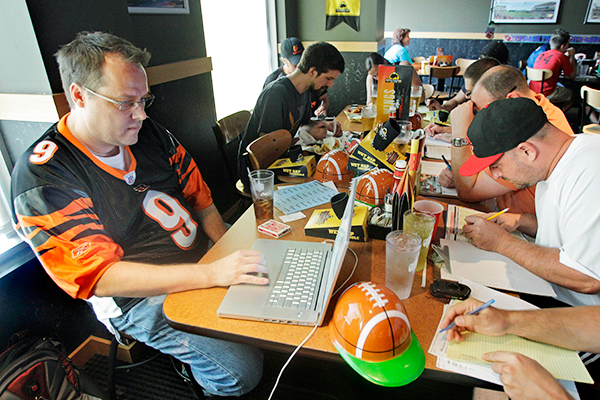Fantasy Sports: The Anti-sex
Unsurprisingly, fantasy in its modern form originated in America. Around 1980, a group of avid fans attempted to decide who was the most knowledgeable (or tragic) baseball fan by picking their favourite players in teams, in what was originally called a “rotisserie league” (named after the NYC restaurant in which the friends met: La Rotisserie Française). They originally worked out their scores by hand, using formulas they invented themselves and the stats provided in the evening newspapers. The game caught on. Copycat leagues began to spring up, and usable computers morphed the game into the fully automated, internet-based version we have today. Other American sports were easily integrated thanks to their fastidious statistical record-keeping, but nowadays you can play a version of “fantasy” for almost every sport imaginable in any part of the world, including, unbelievably, surfing.
So what is the appeal of “fantasy”? I think it’s the combination of skill and chance that makes it so frustrating yet satisfying. Just like poker, success is determined by how well you play the game, but also by fate. The skill is in predicting what is going to happen – which players are going to perform well, and which are going to flop. But these are real people, and this is sport. There is no way of knowing for certain. No amount of research can tell you exactly how things will play out. Studs will flop or get injured, washed-up veterans will have breakout years, and waiver wire sleepers will stay frustratingly dormant (so much jargon). All you can do is hope, and that’s half the fun.
Something about the strange amalgam of jockish sport nuttery and nerdish bookkeeping makes fantasy a complete turnoff for the ladies. I have never met a girl who can even begin to comprehend why anyone would devote time to fantasy sports. If a girl purports to understand or even (God forbid) enjoy fantasy sports, I propose that they are not a girl at all, and recommend a genital inspection immediately. No girl could ever understand the addictive harmony of sport, stats, and squabbling that fantasy provides, and it’s probably better that they don’t. People who play fantasy football may get girls despite fantasy football, never because of it. Fantasy sports are the anti-sex. Sporting Dungeons and Dragons with fewer dice.
Most fantasy sports rely on either a draft system in which each (real-life) player can only be in one (fantasy) player’s team, or a budget system where players have a pre-set budget to “buy” a team of players. As the season plays out, each player selected earns points for your team based on how well they perform. The person with the most points at the end of the season is obviously the smartest, and is declared the winner. Players are swapped, sold, traded, transferred, bought, or discarded throughout the season, so each player must maintain their team week-to-week based on what they think is going to happen for the rest of the season. Researching and tinkering with your team can become an extremely time-consuming, addictive process, which can begin to take over your life a little too much if you are not careful (especially around exam time).
Fantasy used to be an extremely niche pastime enjoyed only by fanatical followers of American sports, but marketers and broadcasters eventually tapped into its value and made it huge. In New Zealand alone, the number of fans who manage a Fantasy Premier League team is in the tens of thousands, and there are over 10 million teams worldwide. Journalists can now make a living solely as fantasy “gurus”. What was once a slightly embarrassing subculture is venturing closer and closer to centre stage. Girls, many of your friends and boyfriends probably already play. Don’t even try to understand it – just don’t hate them for it.







